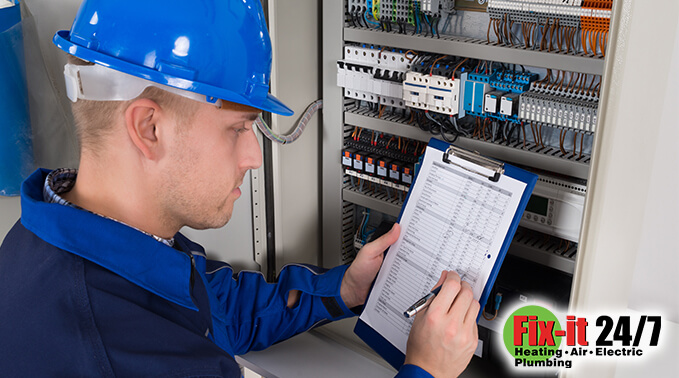Room-By-Room Electrical Safety Checklist
January 11, 2019

While you’re engaged with your New Year’s resolutions and planning improvements for your living space, make sure you go over this electrical safety checklist for each room in your home.
Electrical fires alone account for “an estimated 51,000 fires each year, nearly than 500 deaths, more than 1,400 injuries, and $1.3 billion in property damage” (ESFI).
Use this home electrical safety checklist to keep your home and family safe all year long, but remember that some things, such as testing smoke alarms, CO detectors, and GFCIs/AFCIs should happen on a monthly basis.
Room-By-Room Electrical Safety Checklist
All Rooms
Lights
- Inspect all light fixtures and make sure you are using the correct wattage bulb.
- If you don’t know the appropriate wattage, use 60 watts or less. Exceeding the maximum wattage on a light fixture can cause a fire.
- If the fixture uses a mini-bulb, use 25 watts or less. If your light is producing a lot of heat, you should probably switch it out with a lower wattage bulb.
- Make sure all combustibles, including cloth, papers, and plastics are far away from all heat sources, including your light fixtures.
We recommend switching to LED bulbs, which produce less heat and are much more energy efficient. LEDs require just 6-8 watts to produce 800 lumens; incandescent bulbs use 60 watts.
Outlets and Switches
- Check all outlets and switches for electrical hazard signs.
- Test the GFCI and AFCI outlets and breakers in your home to see if they work. If they aren’t working, contact an electrician.
- Are any outlets or switches hot to the touch?
- Are any outlets sparking?
- Do all of your plugs fit snugly into your electrical outlets?
- Are the faceplates covering your outlets securely?
- Do you have tamper resistant receptacles (TRRs) installed in homes with young children?
Electrical Cords and Devices
- Inspect electrical cords for damage. Look for signs of damage, such as exposed wiring, cracked and frayed cords.
- Make sure your cords are not running under carpets, wrapped tightly around anything, or in any high-traffic areas.
- Double-check that none of your cords are stapled or nailed to walls or baseboards.
- Inspect electrical devices. All of your electrical parts and components should be in a dry location, with some air circulation around it.
- Take a look at your entertainment system and other major electrical devices for proper air circulation and never place combustibles, such as paper and cloth, around the equipment.
- Extension cords are for temporary use only. If you need additional outlets, contact an electrician.
Bathroom
- Inspect your hair dryers, curling irons, electric toothbrushes, and razors. Look for damaged electrical components and replace/repair any electrical devices if necessary. Exposed wires, sparks, and buzzing sounds are indicators of an electrical shock or fire hazard.
- Unplug electrical devices when not in use. In addition to running up your energy bill, even when not in active use, plugged-in devices are a shock hazard if they come into contact with water.
- While a cell phone by itself isn’t powerful enough to deliver a shock when dropped into the tub, if it is charging, the cord (especially if damaged) carries enough current to be deadly. Never have anything that is plugged into an outlet anywhere near the tub!
- Test your ground fault circuit interrupters (GFCIs) every month to ensure proper operation.
Kitchen
- Inspect tabletop appliances. Unplug your tabletop appliances, such as toasters and blenders, when not in use. Electrical devices draw power even when not in use, running up your energy bill.
- Make sure electrical cords are not anywhere near any heat sources, such as your stovetop.
- Ensure your electrical appliances are far away from the sink and any other moisture sources.
- Appliances should never accidentally fall into the sink or be sprayed by water. Your GFCI outlets should protect you, but they need to be tested to ensure proper operation.
- Inspect your large electrical appliances. If you have ever received a shock from one of your appliances, have it checked out by a qualified electrician. It is highly recommended that you periodically clean the coils on the back of your refrigerator and allow enough breathing room around the coils. Cleaning your refrigerator coils will not only save you on your electricity bill but will also reduce the risk of an electrical fire.
- Additionally, check your oven and stovetop and make sure that there are no combustibles in the area. Combustibles, such as potholders, paper towels, and plastics should be far away from the cooking area.
Bedroom
- Inspect your electrical blankets for cord damage and any dark or burned spots. Check the manufacturer instructions for proper use.
- Test your smoke detectors and make sure they are located in every bedroom, outside of the sleeping area, and on every level of the home.
- Make sure your home, especially the bedrooms, are outfitted with AFCI protection by contacting a qualified electrician.
Basement and Garage
- Inspect your electrical panel. Is your breaker or fuse box labeled correctly? Save yourself some time and trouble by indicating which fuse or breaker connects to which circuit or room in the home.
- If you have GFCIs or AFCIs installed at the breaker box, have you tested them in the last 30 days? Are your fuses correctly sized for the electrical demand? An incorrectly sized fuse can create an electrical hazard. If you are experiencing frequently tripped breakers or blown fuses, contact an electrician right away.
- Take a look at all of your electrical power tools. Make sure all of your power tools have three-pronged plugs, which means that they have proper grounding and are double insulated. At the very least, make sure your power tools are plugged into GFCI-protected outlets. If your power tools don’t have these safety features, consider replacing them.
Annual Electrical Safety Inspection
If you’re in the Denver Metro area, schedule an annual electrical safety inspection from Fix-It 24/7. Sign up for our Green Club and enjoy automatic plumbing, electrical, and HVAC tune-ups and safety inspections.
This safety checklist, while useful, is not a substitute for a professional diagnosis. Only a licensed electrician can make sure your home is up-to-code (National Electrical Code).
Contact Fix-It 24/7 for FAST 24/7 service, upfront pricing, and friendly, licensed electricians!
We are available for all your plumbing, heating, air conditioning, and electrical needs in the Denver Metro area.
Service You Can Count On
We came from humble beginnings, having started as just a small family
business. And while we’ve experienced growth, Fix-It 24/7






